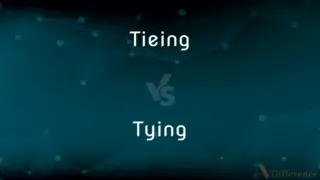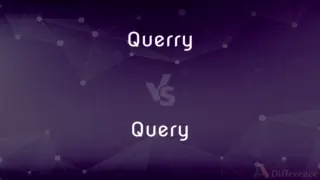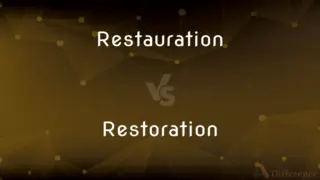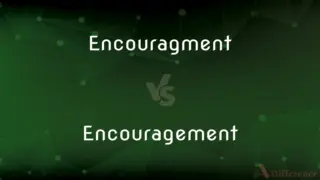Becomming vs. Becoming — Which is Correct Spelling?
By Tayyaba Rehman — Updated on March 21, 2024
"Becomming" is incorrect; the right spelling is "becoming," which means progressing or developing into a particular state or form.
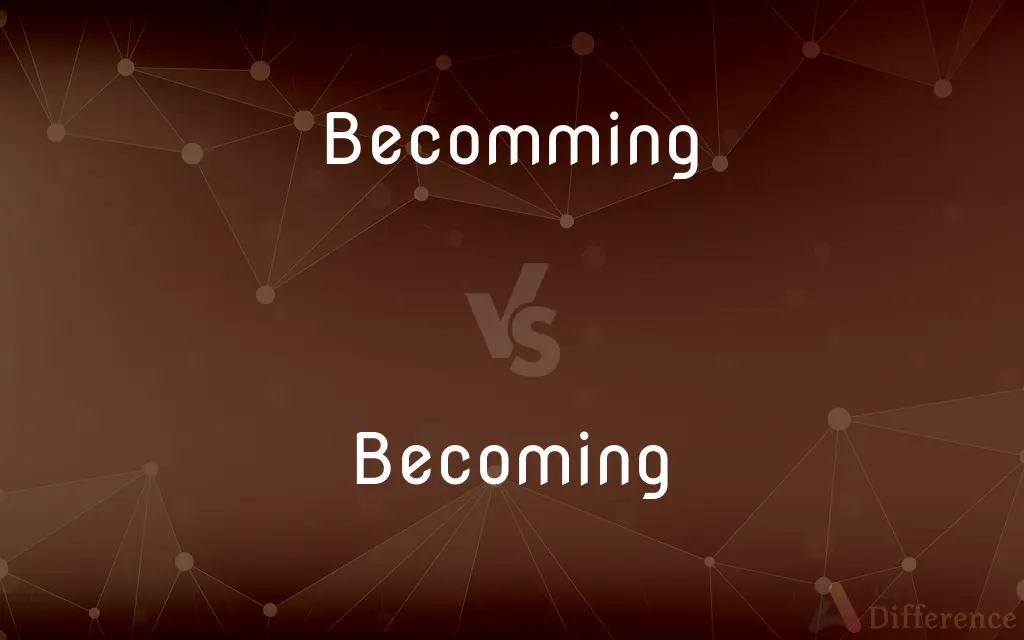
Table of Contents
Which is correct: Becomming or Becoming
How to spell Becoming?

Becomming
Incorrect Spelling

Becoming
Correct Spelling
ADVERTISEMENT
Key Differences
Remember, one "m" is enough! Double "m" is excessive for "becoming."
Visualize "becoming" as "be-coming." Splitting it this way might help remember the single 'm'.
Cross-check with popular literature or online tools. You'll hardly find "becomming."
Think of the word "come" which is part of "becoming" – it doesn't double its "m" in the present tense.
English often doubles consonants for short vowel sounds, but "become" has a long 'o', so no need to double the 'm'.
ADVERTISEMENT
How Do You Spell Becoming Correctly?
Incorrect: It's becomming colder as winter approaches.
Correct: It's becoming colder as winter approaches.
Incorrect: The sky is becomming cloudy, it might rain soon.
Correct: The sky is becoming cloudy, it might rain soon.
Incorrect: She is becomming an excellent pianist.
Correct: She is becoming an excellent pianist.
Incorrect: He is becomming a skilled carpenter.
Correct: He is becoming a skilled carpenter.
Incorrect: This trend is becomming popular among teenagers.
Correct: This trend is becoming popular among teenagers.
Becoming Definitions
Growing or developing into a particular type or stage.
Her caterpillar is becoming a beautiful butterfly.
Suitable or fitting, especially in a way that enhances appearance.
The dress was very becoming on her.
The process of coming to be something or of passing into a state.
Adolescence is about becoming an adult.
A transformation or transition from one state to another.
Through meditation, she experienced a profound becoming of her true self.
Beginning to be or showing promising signs.
The weather is becoming warmer as spring approaches.
(of clothing) looking good on someone
What a becoming dress!
Pleasing or attractive to look at
Your suit is very becoming. That outfit is very becoming on you.
Appropriate, suitable, or proper
Please conduct yourself in a manner becoming to your age.
Present participle of become
The act or process by which something becomes.
Pleasingly suitable; fit; congruous; beautiful
Decent, respectable
Appropriate or fit; congruous; suitable; graceful; befitting.
A low and becoming tone.
Such discourses as are becoming of them.
That which is becoming or appropriate.
According with custom or propriety;
Her becoming modesty
Displaying or setting off to best advantage;
A becoming new shade of rose
A becoming portrait
Becoming Meaning in a Sentence
The days are becoming longer in the summer.
He's becoming better at math thanks to his tutor.
The caterpillar is becoming a butterfly.
That style is becoming very fashionable.
This neighborhood is becoming more vibrant.
She is becoming more confident with every speech she gives.
The technology is becoming outdated.
The weather is becoming warmer each day.
Your efforts are becoming fruitful.
It's becoming necessary to update our computer systems.
They are becoming experts at the game.
The garden is becoming a beautiful oasis.
Her artwork is becoming well-known.
The project is becoming a success.
Their relationship is becoming stronger.
His cooking skills are becoming impressive.
The team is becoming more cohesive.
Your English is becoming much better.
Her ideas are becoming more innovative.
The story is becoming more interesting.
The problem is becoming more apparent.
The puppy is becoming more obedient.
The company is becoming a leader in the industry.
Their band is becoming locally famous.
The situation is becoming more complicated.
Becoming Idioms & Phrases
Becoming of age
Reaching a specific age where one gains certain rights or responsibilities.
He is looking forward to becoming of age to vote in the next election.
Becoming second nature
A task or skill that has become very familiar and is done almost automatically.
After practicing for months, playing the piano is becoming second nature to her.
Becoming the norm
Something that is becoming standard or typical.
Working from home is becoming the norm for many companies.
Becoming a reality
Something that is beginning to happen or exist.
Her dream of becoming a doctor is finally becoming a reality.
Becoming a force to be reckoned with
Growing in strength or influence to the point of being very powerful.
The young athlete is becoming a force to be reckoned with in the sport.
Becoming entangled
Becoming involved in a complex or difficult situation.
He's becoming entangled in bureaucratic red tape.
Becoming the talk of the town
Becoming something that everyone is discussing.
The new restaurant is becoming the talk of the town because of its unique dishes.
Becoming a part of the scenery
Being in a place so often that people start to not notice you.
After working there for so many years, he's just becoming a part of the scenery.
Becoming acquainted
Getting to know someone or something.
I'm becoming acquainted with the new software.
Becoming a habit
An action that is performed so often that it becomes a regular part of one's routine.
Drinking a glass of water every morning is becoming a habit for me.
Becoming a legend
Becoming very famous or well-known, often after a long time.
The musician is becoming a legend in his own lifetime.
Becoming a thing of the past
Something that is becoming outdated or no longer used.
With the rise of digital books, physical libraries are becoming a thing of the past.
Becoming clear
Something that is becoming easy to understand or evident.
After the explanation, the solution to the problem is becoming clear.
Becoming a memory
Something that is passing and will soon be remembered only.
Our vacation is quickly becoming a memory as we return to work.
Becoming a milestone
Becoming an important event in the development or history of something.
This discovery is becoming a milestone in scientific research.
Becoming the backbone
Becoming the main support or foundation of something.
Volunteers are becoming the backbone of our organization.
Becoming a laughingstock
Becoming a person or thing that is widely regarded as a failure or a subject of ridicule.
He's afraid of becoming a laughingstock if he fails.
Becoming a shadow of oneself
Becoming a weaker or less effective form of oneself.
After the illness, he was becoming a shadow of his former self.
Becoming unhinged
Becoming mentally unstable or losing control of oneself.
The stress of the job is making her becoming unhinged.
Becoming a cross to bear
Becoming a burden or a source of great difficulty that one must deal with.
The old family house is becoming a cross to bear due to its constant need for repairs.
Common Curiosities
Which conjunction is used with Becoming?
No specific conjunction is exclusively used with "becoming." It depends on the sentence structure.
What is the root word of Becoming?
The root word is "become."
Which vowel is used before Becoming?
"o" is used before "becoming" in words like "not becoming."
What is the verb form of Becoming?
The verb form of "becoming" is "become."
What is the plural form of Becoming?
It doesn't typically have a plural form, but in some contexts, it could be "becomings."
What is the pronunciation of Becoming?
It's pronounced as /bɪˈkʌmɪŋ/.
What is the singular form of Becoming?
"Becoming" is already in its singular form.
Why is it called Becoming?
"Becoming" originates from the verb "become," and denotes the process of change or development, or as an adjective, something that is appropriate or flattering.
Which article is used with Becoming?
Both "a" and "the" can be used, depending on context.
Is Becoming a countable noun?
No, it's not typically counted.
Is Becoming a vowel or consonant?
"Becoming" is a word, not a single letter.
Is Becoming a collective noun?
No, it's not a collective noun.
Is the word Becoming imperative?
No, it is not imperative.
Which preposition is used with Becoming?
It varies based on context. For example, "in becoming" or "of becoming."
How do we divide Becoming into syllables?
Be-com-ing.
What is a stressed syllable in Becoming?
The second syllable, "com," is stressed.
What part of speech is Becoming?
It can be an adjective or a noun (gerund).
Is the word Becoming a gerund?
Yes, when it acts as a noun, it's a gerund.
Is the word “Becoming” a Direct object or an Indirect object?
It can be either, depending on the sentence structure.
How many syllables are in Becoming?
Three.
Which determiner is used with Becoming?
It can vary, such as "this," "that," or "her" based on the context.
What is the first form of Becoming?
Become.
What is the second form of Becoming?
Became.
Is Becoming an adverb?
No, "becoming" is not an adverb.
Is Becoming an abstract noun?
When used as a noun (gerund form), it can be considered abstract as it denotes a process or state.
Is the Becoming term a metaphor?
Not in itself, but it can be used metaphorically in various contexts.
What is another term for Becoming?
Suitable (when used as an adjective).
Is Becoming a noun or adjective?
"Becoming" can be both a noun (gerund) and an adjective.
Is Becoming a negative or positive word?
It's neutral, but when used as an adjective, it often has a positive connotation.
What is the opposite of Becoming?
Unbecoming.
What is the third form of Becoming?
Become.
How is Becoming used in a sentence?
"Her new dress is very becoming on her."
Share Your Discovery

Previous Comparison
Arkward vs. Awkward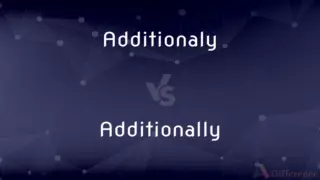
Next Comparison
Additionaly vs. AdditionallyAuthor Spotlight
Written by
Tayyaba RehmanTayyaba Rehman is a distinguished writer, currently serving as a primary contributor to askdifference.com. As a researcher in semantics and etymology, Tayyaba's passion for the complexity of languages and their distinctions has found a perfect home on the platform. Tayyaba delves into the intricacies of language, distinguishing between commonly confused words and phrases, thereby providing clarity for readers worldwide.

